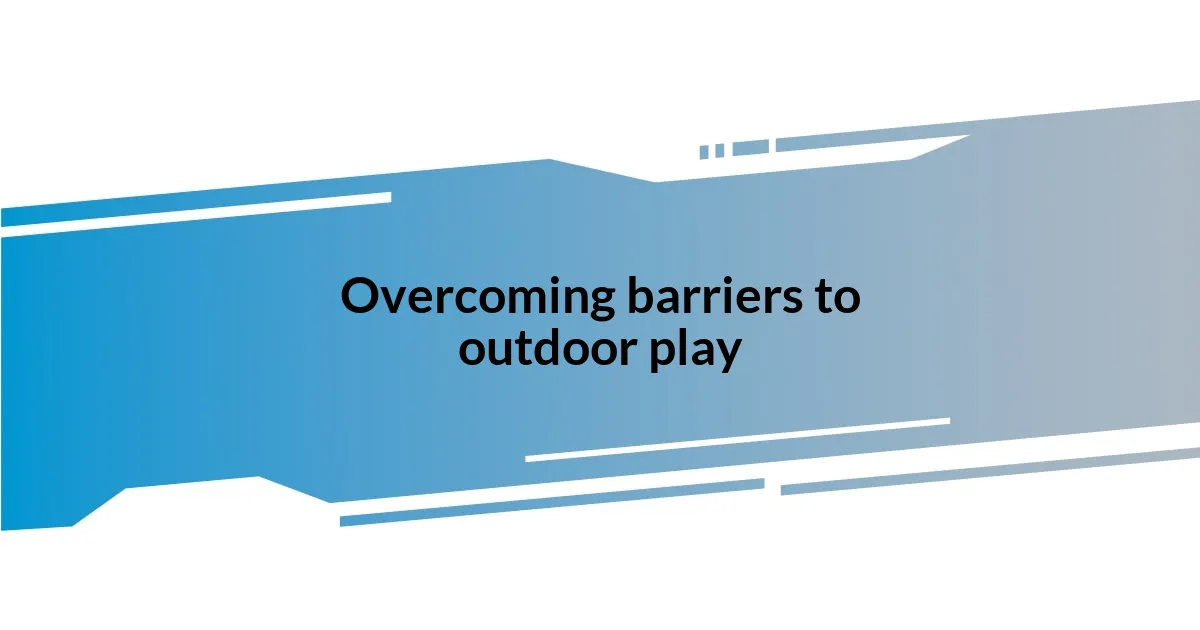Key takeaways:
- Outdoor play is essential for children’s physical health, promoting cardiovascular fitness, muscle and bone strength, and coordination.
- Engaging in outdoor activities fosters creativity, social skills, communication, teamwork, and conflict resolution among children.
- Spending time in nature improves mental health and emotional well-being, providing stress relief and promoting resilience.
- To encourage outdoor play, parents can overcome barriers by ensuring safety, prioritizing family time, and seeking local green spaces.

Importance of outdoor play
Outdoor play is crucial for children’s physical health. I remember the exhilaration of racing down a hill on a bike or climbing a tree, feeling my heart pound with excitement. Isn’t it fascinating how those moments not only improved my strength and coordination but also made me feel vibrant and alive?
The benefits of outdoor play extend beyond just physical activity; they foster creativity and social skills too. I often think about the impromptu games of tag or hide-and-seek that sparked laughter and friendships in my childhood. How does free play outdoors allow kids to navigate social dynamics and resolve conflicts in real time? Those experiences shaped my ability to connect with others and think critically.
Moreover, spending time in nature has a profound impact on mental health. I’ve found that nothing eases stress quite like a walk in the park or a breath of fresh air on a sunny day. Have you ever noticed how the simple act of being outside can shift your mood? This connection to nature allows children to feel grounded and develop resilience, forming a foundation for their emotional well-being.

Benefits for physical health
Outdoor play significantly enhances physical health in children. When I think back to my own experiences, I remember the thrill of running around the playground, which not only fueled my energy but also improved my cardiovascular fitness. Isn’t it interesting how just a few hours of play outside can contribute to building stronger muscles and bones, setting the stage for a healthy future?
Moreover, engaging in outdoor activities leads to improved coordination and balance. I vividly recall the day I learned to ride a skateboard; my perseverance not only rewarded me with a new skill but also taught my body to respond more nimbly to challenges. It’s those moments of unplanned adventure that provide children with the opportunity to test their limits and develop essential motor skills.
Additionally, regular outdoor play is linked to maintaining a healthy weight, which is becoming increasingly crucial in today’s sedentary society. I can’t help but think of all the summers spent biking around the neighborhood, feeling the wind on my face, and how that active lifestyle helped me stay fit without even realizing it at the time. What role do you think outdoor play plays in fostering lifelong habits of physical activity?
| Benefit | Description |
|---|---|
| Cardiovascular Fitness | Boosts heart health through regular physical activity. |
| Muscle and Bone Strength | Encourages development of strong muscles and bones. |
| Coordination and Balance | Enhances motor skills through dynamic play. |
| Weight Management | Helps maintain a healthy weight with active lifestyle choices. |

Enhancing social skills through play
When kids play together outdoors, they naturally learn how to communicate and cooperate. I remember the time my friends and I built a makeshift fort out of sticks and old blankets; we had to negotiate where to put each piece and resolve disagreements about who was the leader of the project. It was in those moments of collaboration that I discovered the importance of sharing ideas and listening to others, skills that are invaluable in team settings later in life.
To fully appreciate the social skills that develop through outdoor play, here are some key aspects to keep in mind:
- Communication: Kids learn to express their thoughts and ideas while interacting with peers.
- Conflict Resolution: They navigate disagreements, learning to compromise and find solutions.
- Teamwork: Collaborative games foster a sense of belonging and shared responsibility.
- Empathy: Engaging in play teaches children to recognize and respond to others’ emotions and needs.
I still find joy in reflective moments, recalling how those childhood adventures created strong bonds and friendships that have lasted into adulthood.

Creative outdoor play ideas
Creative outdoor play ideas can really spark children’s imaginations and free their spirits. One of my fondest memories is when my friends and I transformed a simple patch of grass into a mini obstacle course. We used hula hoops, cones, and even ropes to create challenges that tested our agility. This spontaneous game not only filled our afternoons with laughter but also ignited a sense of friendly competition that pushed us to be more creative and physically active. Have you ever seen how a little bit of turf can become a world of adventure in a child’s eyes?
Another unique idea is to engage kids in nature-inspired scavenger hunts. I remember carefully making a list of items to find in the park—the biggest leaf, the funniest shaped rock, or even a feather. This activity not only encouraged exploration but also led to countless stories of discovery, as we shared interesting facts about what we found. It’s moments like these that remind me of the joy of exploration. What treasures do you think your kids might uncover on their own adventures?
Artistic play can also be a delightful way to blend creativity with outdoor fun. Setting up a space for nature painting, where children use leaves and twigs to create their artwork, can be incredibly rewarding. I still cherish the time I painted with mud and found materials—it felt like connecting with the earth in a way that left me inspired. Wouldn’t you love to see what vivid masterpieces children can create with the world around them?

Overcoming barriers to outdoor play
Sometimes, the biggest barrier to outdoor play is the worry from parents about safety. I understand this concern; when my children were younger, I stood on the sidelines, nervous every time they ventured near the climbing frame. However, I learned that with proper supervision and setting boundaries, I could allow them to explore while feeling secure. What if we trusted our kids to manage small risks? They often come back with stories of their bravery that remind us all that a little independence is part of growing up.
Another challenge comes from busy schedules that leave little time for outdoor play. I vividly recall days when we rushed from school to extracurriculars, leaving no time for those refreshing outdoor adventures. To overcome this, we consciously prioritized family time in nature, even if it was just a quick walk after dinner. Those short moments outside created invaluable traditions, showing me that quality time doesn’t always need to be lengthy to be memorable. Have you tried carving out just a few moments in your day for outdoor fun?
Finally, limited access to green spaces can make outdoor play difficult in urban areas. During a recent visit to the city, I felt the pinch; my kids longed for hills, trees, and open skies. In response, we looked for local parks and community gardens, discovering spots that provided unexpected joy. I was surprised to find that even a tiny pocket park can foster creativity. If your area lacks nature, have you thought about supporting or advocating for more green spaces? It’s amazing how a little effort can lead to not only personal enjoyment but also community enrichment.